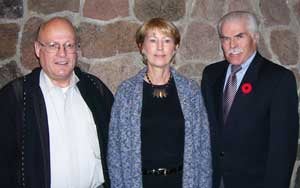People over the age of 80 represent the most rapidly growing segment of the population, and as a whole, this generation is living longer than any previous generation in human history,

Spirituality and Aging’s two-fold purpose is to promote research in the field of spirituality and aging that will enhance the well-being of older adults, and to be a resource to students, clergy, chaplains, and caregivers through university classes, public lectures, and workshops. According to Mellinger,
spirituality and aging seems to be an underdeveloped area of focus in the academic community. In addition, faith communities are signaling that this is an area needing increased attention. While many organizations recognize the value of spirituality in the aging process, few are giving it primary attention.
This initiative was made possible through the leadership of Ron and Barb Schlegel and Oakwood Retirement Communities which operates eight seniors care complexes in Ontario and co-owned by the Schlegels. Ron noted that the connection to Conrad Grebel represents this area coming full circle.
"In our first nursing home facility in London (Ontario) almost 40 years ago, the chaplain was one of our first staff positions and Ralph Lebold, who went on to serve as president at Conrad Grebel, filled this role.
Schlegel is very concerned that the spiritual component of seniors is adequately understood and resourced, not only in long-term care facilities, but in our congregations and communities.
Mellinger spent the last year talking with chaplains and residents in long-term care facilities and their families, teaching undergraduate and graduate students, and educating pastors and lay-leaders who visit residents in long-term care facilities. These experiences have convinced her that
a division in Spirituality and Aging with a focus on research and education could make a significant and immediate contribution in the lives of residents currently living in long-term care residences, in faith communities, and in the longer-term, in the education of chaplains, students and caregivers.
During the fall of 2006, Mellinger taught “Aging and the Spiritual Life”, a combined undergraduate and graduate course that included a practicum and attracted students ranging from 22 to 66 years of age. Discussions were rich and lively as students engaged across cultures, generations, and faith perspectives. This is one early example of the kind of educational experiences that Mellinger hopes to develop.
The Spiritual Care for Seniors program sponsored an evening workshop, led by Mellinger, on “Spiritual Care for Seniors” for thirty Pastoral Care visitors at Calvin Presbyterian Church in Kitchener. The feedback was overwhelmingly positive with comments such as
This has been so helpful,
We need more of this,
and
I wish I had known some of this 20 years ago when I was caring for my parents.
The RIA Spiritual Care for Seniors program also sponsored a public lecture with Dr. Ellen Bouchard Ryan, Professor of Psychiatry and Gerontology at McMaster University in November. The focus of this lecture was "Spiritual Care for Persons with Dementia." Bouchard Ryan spoke on how spiritual care is grounded in the concept of Personhood which moves away from viewing dementia as a biomedical problem and toward focusing on the person who has dementia as a person of value and worth. Rather than focusing on the losses of the person, Personhood works to enhance their remaining capabilities. One person commented,
this has been very helpful. My mother was diagnosed recently with early Alzheimer’s. I’m leaving today feeling much more hopeful.
A chaplain commented,
Now I feel like I have better skills to communicate to persons with dementia.
Nearly 100 people attended the lecture, a clear sign that there is a need in the community for more education on seniors and spirituality.
Conrad Grebel and the RIA hope to meet this need by establishing an ongoing Spirituality and Aging program that will consist of long term research, academic courses, community education, and professional development. A certificate program in Spiritual Care is under consideration.
According to Mellinger, the seniors of this generation are
truly pioneers in aging and it is essential that we hear their stories, that we understand their experience, and that we find suitable ways to sustain and nurture their spiritual life on this journey.